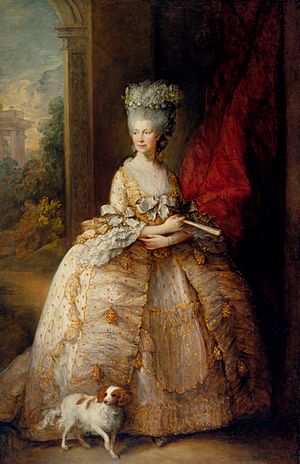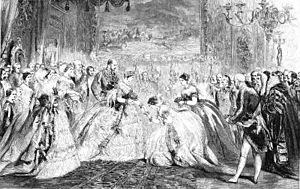Queen Charlotte's Ball facts for kids
The Queen Charlotte's Ball is a special yearly event in Britain. It was started in 1780 by King George III. He created it to celebrate the birthday of his wife, Charlotte of Mecklenburg-Strelitz, who the ball is named after. Originally, the ball helped raise money for the Queen Charlotte's and Chelsea Hospital. The yearly ball continued even after Queen Charlotte passed away in 1818. However, the British royal family criticized it in the 1950s and 1960s, and it stopped in 1976.
The ball was brought back in the 21st century by Jennie Hallam-Peel. She used to be a debutante herself. The new ball focuses on teaching business skills, networking, and good manners. It also raises money for charities. Today, young women presented at the ball bow to a large birthday cake. This cake honors Queen Charlotte.
Contents
History of the Ball

The Queen Charlotte's Ball is named after Charlotte of Mecklenburg-Strelitz. Her husband, King George III, held the first ball in 1780. It was a celebration for her birthday. At these early balls, the Queen stood next to a huge birthday cake. Young women, called debutantes, would bow to her. Money raised from the ball helped fund a women's hospital in London. This hospital was later named the Queen Charlotte's and Chelsea Hospital. The ball continued every year to celebrate the queen's birthday. It became the most important debutante ball of the London Season.
Royal Presentations
After Queen Charlotte died in 1818, the ball was still hosted by the British sovereign and their consort. Young women from noble and gentry families were presented as debutantes. This presentation happened at the royal court. After being presented, debutantes could join in exclusive social events. These included parties, balls, and horse races. They were also considered ready for marriage. Debutantes at Queen Charlotte's Ball would bow to the king or queen. The monarch would stand beside a large birthday cake.
Changes and Decline
In the late 1950s, the Duke of Edinburgh expressed his strong disapproval of the ball. He said it was "bloody daft." He insisted it should no longer be held at Buckingham Palace. Princess Margaret also reportedly disliked the ball. She was concerned that some candidates were paying former debutantes to sponsor them. A sponsorship was needed to take part. In 1958, Elizabeth II announced she would no longer have debutantes presented at court. During the 1960s and 1970s, fewer young women participated in debutante balls across the United Kingdom. This led to the Queen Charlotte's Ball stopping in 1976.
Modern Revival
The Queen Charlotte's Ball was brought back in the early 21st century. Jennie Hallam-Peel, a former debutante, revived it. She works as a lawyer and runs a company called The London Season. Peter Townend, a social editor, reportedly asked Hallam-Peel to "keep the Season alive" before he passed away in 2001. She began visiting top private schools in London. There, she selected students to become new debutantes.
New Focus and Participants
The modern ball's main goal changed. It moved from entering high society to teaching useful skills. These include business skills, networking, and good manners. It also focuses on raising money for charities. The ball was once only for British nobility and gentry. Now, it includes debutantes from the British upper middle class. Young women from other countries, especially Eastern Europe and Asia, also take part. Debutantes must be preparing for or already attending a university. They also need to participate in the traditional London season events. These include the Henley Royal Regatta, Royal Ascot, and the Glyndebourne Festival Opera.
Etiquette and Hosts
The young women are trained in proper etiquette. This includes rules for diplomacy and how to act in formal settings. They learn about orders of precedence for different countries. They also learn about seating arrangements, invitations, and gifts. Other topics include titles and forms of address and flag rules. They also learn about honors and decorations.
The monarch no longer hosts the ball. Instead, John Seymour, 19th Duke of Somerset and Judith-Rose, Duchess of Somerset, are the official hosts. Princess Katarina of Yugoslavia and Princess Olga Andreevna Romanoff serve as royal patrons. Other hosts have included Murray Beauclerk, 14th Duke of St Albans and Gillian Beauclerk, Duchess of St Albans. Sir David O'Grady Roche, 5th Baronet, and The Honourable Lady Roche have also hosted. Prince Nawab Mohsin Ali Khan has been a royal patron.
Traditions and Locations
Instead of bowing to a monarch, the debutantes now bow to the birthday cake itself. Each year, one debutante is chosen as "Debutante of the Year." She gets to cut the cake with a special ceremonial sword.
Since its return, the ball has been held at several grand locations. These include Dartmouth House, Leeds Castle, Kensington Palace, and the Royal Courts of Justice. From 2012 to 2016, the Queen Charlotte's Ball worked with the Shanghai International Debutante Ball. They organized events together during that time.
 | Audre Lorde |
 | John Berry Meachum |
 | Ferdinand Lee Barnett |


